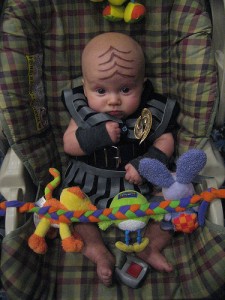 So this is a picture of my kid getting into the back of a cab, with no carseat, on Avenue B on Saturday.
So this is a picture of my kid getting into the back of a cab, with no carseat, on Avenue B on Saturday.
Am I a bad father? Oh yeah.
Okay, so usually he’s in someone’s arms when we ride in a cab. And we don’t do this often, maybe a couple times a month. But still: It would only take one not-so-major accident to make it all seem like a very bad idea.
But I can’t be the first NYC parent to do this. This study of an anonymous U.S. urban area found that only 22% of kids under 1 used car seats in taxis. It makes sense: I mean, you are daytripping for pork and it starts to rain. Or the C, New York’s worst subway line, breaks down. You cannot carry a car seat around everywhere you go just in case. The Graco Nautilus weighs 25.6 pounds. Ours weighs almost that much. It just couldn’t be done.
After getting home (unscathed) I tracked down the official New York Taxi and Limousine Commission stance:
Drivers of yellow medallion taxicabs and for-hire vehicles and their passengers, are exempt from laws regarding car seats and seatbelts. Keep in mind, the TLC encourages everyone in the vehicle to buckle their seatbelts while riding in a cab. There are no Taxi and Limousine Commission rules regarding this, as it is a State exemption. Passengers with children are encouraged to bring their own car seats, which the drivers must allow passengers to install.
*NOTE – Children under the age of seven are permitted to sit on an adult’s lap.
So my wife, who only half-jokingly said that they’d come and take our kids away if I went public with our hooligan cab riding, was wrong. Turns out that it’s completely legal.
The bureaucrats may exempt cabs from child safety laws, but they can’t exempt us from the laws of physics. I couldn’t find stats on how many kids are injured in cab accidents (I tried Googling it, but the results were almost all personal injury lawyer websites–did you know that taxi liability is only $100,000 per passenger?). But common sense says it just ain’t that safe.
Of course, I tell myself that our kids crawling around the back of a cab stuck in traffic are still safer than kids in most parts of the world. But then I remember Germany — who will stand for rules and accountability if not the Germans? — where Viviane, with her bum knee and all, tried to order a cab 30 minutes ahead of time in Lübeck and found that there was no cab in town that would accept her and her child for the five-minute ride unless she had her own car seat.
Later in Berlin, a sweet-smelling Anatolian cabbie explained that German law puts a tremendous amount of responsibility on the shoulders of the taxidrivers. “If that baby dies in an accident,” he said, “the cab driver goes to jail.”
There’s a lot of pressure on New York cabbies (paying off those crazy-expensive hack licenses, getting caught up in the war on cab gab, surviving Yonkers), and I don’t think they are thinking much about child safety. Nor does the city require them to.
Do I prefer that approach or the German nanny-state tactics? I’m a libertarian on the issue, I guess: it should be left to the parents, even selfish ones like me, to make the call. Finding that balance between convenience and safety, after all, is a big part of what raising a small child is all about.



